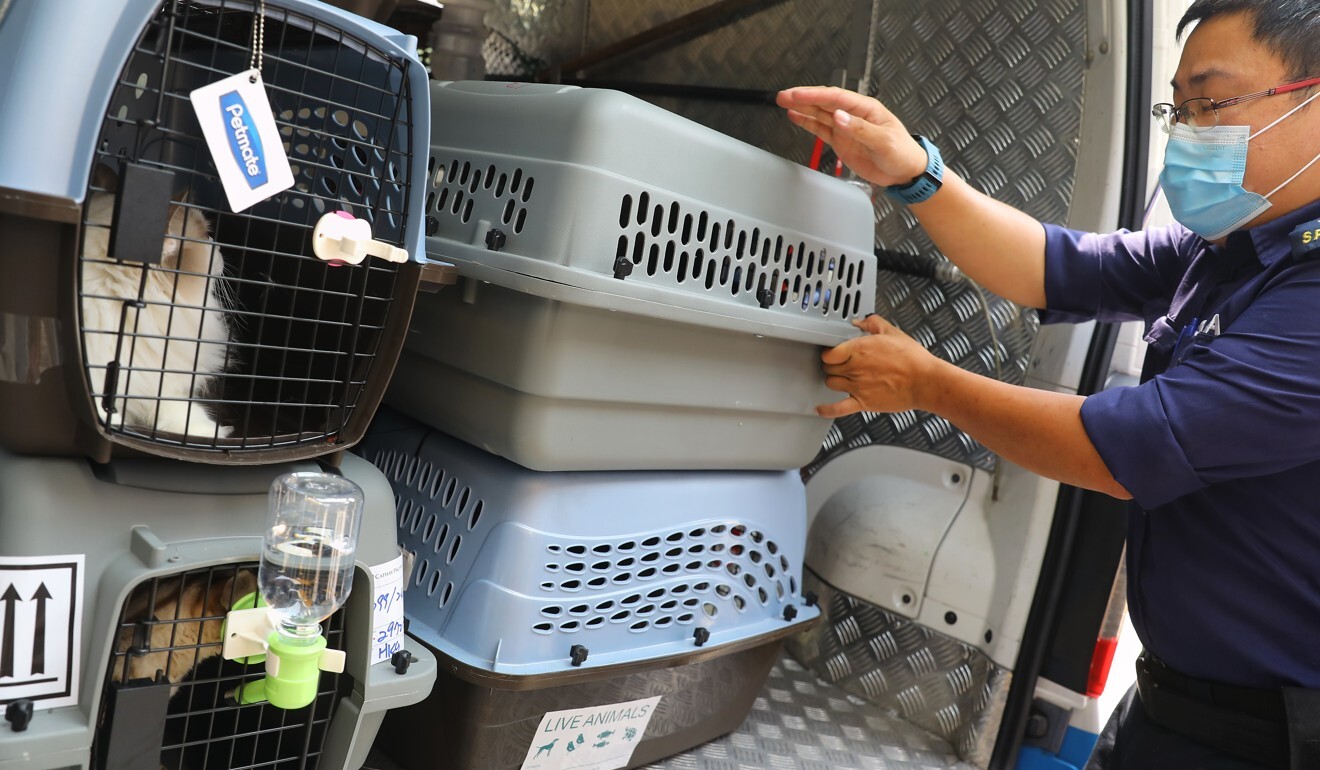
Exclusive | More mainland Chinese pet owners frantically seeking whereabouts of beloved animals after gruesome Hong Kong smuggling case
- Revelation follows police raid of Tuen Mun pet hotel, suspected to be part of an illegal operation to transport animals of returning mainland Chinese, with city as transit point
- Panic stems from morbid find of 15 dead cats and dogs washed up on city’s shore in recent days, suspected to have been drowned by smugglers fleeing police chase
At least 40 frantic pet owners in mainland China are demanding details of missing animals that agents had been entrusted to transport back from overseas, after Hong Kong police revealed a gruesome smuggling case in which the carcasses of 15 dogs and cats were found washed up on beaches.
The Post has learned the case could just be the tip of the iceberg of an illegal operation involving pets shipped from overseas to the mainland to be reunited with their owners, with Hong Kong serving as the transit point amid travel limitations.

The revelation came as police, customs and agricultural officers raided a pet hotel in Tuen Mun on Friday and rescued 22 dogs and 26 cats registered with microchips – a legal requirement in many countries – that were believed destined for the mainland.
The animals were thought to belong to mainland Chinese owners who had returned home after working or studying abroad, then engaged the services of transport agents – who claim to run legal businesses – to retrieve their pets.
A police source told the Post more pet hotels might be investigated.
Fear grips pet owners after gruesome smuggling find on Hong Kong shores
In the latest raid, the authorities and the Society for the Prevention of Cruelty to Animals (SPCA) swooped on Pet Oasis on Hing Fu Street, arresting a 54-year-old man and 29-year-old woman on suspicion of conspiracy to smuggle and animal cruelty. They were later released on bail and are required to report back to police later next month.
No signs of animal mistreatment were detected at the hotel, which was fitted with a swimming pool for dogs as its main attraction, according to a police source.
Pet owners the Post contacted said their transport agents had told them the hotel was assigned to provide care for their animals while awaiting customs clearance to be transported across the border.
The police source said the animals were in good condition and would be temporarily in the care of the SPCA. “We’ll try to locate the owners for inquiries,” he added.

About 20 complaints were made by pet owners against the Tuen Mun hotel after their animals had gone missing, another source familiar with the investigation said.
Pet Oasis denied its involvement in smuggling activities on its Facebook page on Saturday morning.
On August 21, at Mui Wo on Lantau Island, police and customs seized goods worth HK$37 million (US$4.8 million) including abalone, electronics, red wine and cosmetic products on a speedboat in one of the biggest smuggling cases of its kind this year.
Why are so many pets abandoned in Hong Kong?
Four travel crates carrying 12 microchipped dogs of various breeds, including labradors, Pomeranians, poodles, Yorkshire terriers and Maltese breeds were also among the seized items. Two mainland men were arrested.
The case took a morbid turn on Wednesday when a crate containing the badly decomposed bodies of three microchipped dogs was found washed ashore near St Stephen’s Beach in Stanley, in southern Hong Kong Island. On Thursday, another two crates with 12 dead cats were found on a Lamma Island beach. Law enforcement sources suspected the animals were thrown overboard by smugglers to destroy evidence as police gave chase.

Ellie Chan, a Hongkonger helping a mainland friend retrieve his pet dog, earlier accused Pet Oasis of lying when it said their three-year-old Maltese poodle had been handed to personnel who would bring the animal across the border. The dog was later found to be among the 12 live animals seized in the Mui Wo operation.
On Friday, Rachel (not her real name), a heartbroken mainland dog owner, told the Post she had lost contact with personnel handling her two-year-old pet after she sent it to Hong Kong from the United States, where she had just finished her studies.
The 24-year-old was not able to bring her pet back to China with her because she could not get a ticket, and both owner and animal had to fly separately. An agent named “Jessie Zhu”, Rachel said, had suggested she send her dog by itself to Hong Kong, where it would be picked up by a concerned party. It reached Hong Kong on August 9.

Rachel said the agent, with whom she communicated on WeChat, told her that they had been using this route of animal transport from the US to China via Hong Kong for 20 years.
But the distressed pet owner said she was never told the service involved smuggling. She was charged 10,000 yuan (HK$11,300) and told the dog would be settled in another pet hotel in Tuen Mun. It was unclear if this hotel was also run by the pair arrested on Friday.
On August 21, Rachel was told that her dog was with local authorities, and learned about the smuggling case from news reports. She approached the agent, who assured her they would find a way to get her pet back.
The agent also offered to compensate her for losses, on the condition she would not pursue and disclose the saga online.

01:09
Starving pets trapped in empty homes in Chinese city at epicentre of coronavirus outbreak
Rachel said she had met more than 40 mainland pet owners online who had experienced the same situation, with some of them already told by Hong Kong police that their beloved animals were among those found dead or still missing.
She said the number of pet owners facing this was growing in size daily. Most had worked or studied in the US, Britain, Australia or New Zealand. They live in different parts of mainland China, including Guangdong, Shanghai, Beijing, Chengdu, Suzhou and Kunming.
After news of the Friday raid broke, Rachel said the agent, “Jessie Zhu”, alerted some of the mainland customers on Saturday morning, telling them to ask friends in Hong Kong to pick up their pets at the Tuen Mun pet hotel – where she said her dog was staying – and its branch in Mong Kok, warning that authorities could soon move in and detain the animals.
I’m grieving. The pain is like tearing your heart and chest apart
The hotel was operating normally during a Post visit to its Mong Kok location on Saturday afternoon, except for one worried customer who had sent a friend to pick up her pet cat.
“My friend asked me to pick up her cat. It’s been stuck in Hong Kong for two weeks,” Echo Ding, 22, said. “It was supposed to be sent back to my friend on the mainland after being transferred from the UK.”
Rachel questioned if the agent’s message to clients was actually aimed at destroying evidence.
She added her friend had become worried about the cat being stuck in the pet hostel after reading about the smuggling case.
“I told my friend that I’d take care of it for now,” she said. “The pet hotel didn’t ask us anything else.”
Rachel, meanwhile, said there could be more victims.
“Some learned from their agents there could be more than 90 victims. I can’t confirm this, but I’m sure the total should be larger than what we are seeing now.
“We handed our healthy babies to them because of trust. And this is how it has ended up,” she said. “I’m grieving. The pain is like tearing your heart and chest apart.”
She added that pet owners had also complained that their agents charged them several times the amount initially agreed upon when the animals reached Hong Kong, citing increased customs fees because of the Covid-19 pandemic.
The tearful woman only reached her mainland home on Friday night after a 14-day compulsory quarantine.
“I haven’t slept for many days. I really can’t,” she said.


